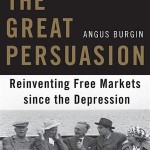 Angus Burgin’s recent book, The Great Persuasion: Reinventing Free Markets Since the Depression (Harvard University Press, 2012), has received a great deal of acclaim from reviewers and readers alike. Burgin is an assistant professor of history at Johns Hopkins University. In Great Persuasion, Burgin explains that he focuses on the members of the Mont Pelerin Society, an international organization founded by Friedrich Hayek in 1947 to bring together economists, philosophers, journalists, and philanthropists who sought to rehabilitate public support for the market mechanism.
Angus Burgin’s recent book, The Great Persuasion: Reinventing Free Markets Since the Depression (Harvard University Press, 2012), has received a great deal of acclaim from reviewers and readers alike. Burgin is an assistant professor of history at Johns Hopkins University. In Great Persuasion, Burgin explains that he focuses on the members of the Mont Pelerin Society, an international organization founded by Friedrich Hayek in 1947 to bring together economists, philosophers, journalists, and philanthropists who sought to rehabilitate public support for the market mechanism.  In the years before the founding of the society, advocates of laissez-faire were marginalized within both the international scholarly community and the American political environment; a half-century later, opposition to state interference in the actions of the competitive market had become pervasive within economics faculties and increasingly influential in the public sphere. The Great Persuasion surveys the dynamics that made this transformation possible: between economists and politicians, intellectuals and rhetoricians, and transnational academic networks and domestic policy debates.
In the years before the founding of the society, advocates of laissez-faire were marginalized within both the international scholarly community and the American political environment; a half-century later, opposition to state interference in the actions of the competitive market had become pervasive within economics faculties and increasingly influential in the public sphere. The Great Persuasion surveys the dynamics that made this transformation possible: between economists and politicians, intellectuals and rhetoricians, and transnational academic networks and domestic policy debates.
U.S. Intellectual History Blog

One Thought on this Post
S-USIH Comment Policy
We ask that those who participate in the discussions generated in the Comments section do so with the same decorum as they would in any other academic setting or context. Since the USIH bloggers write under our real names, we would prefer that our commenters also identify themselves by their real name. As our primary goal is to stimulate and engage in fruitful and productive discussion, ad hominem attacks (personal or professional), unnecessary insults, and/or mean-spiritedness have no place in the USIH Blog’s Comments section. Therefore, we reserve the right to remove any comments that contain any of the above and/or are not intended to further the discussion of the topic of the post. We welcome suggestions for corrections to any of our posts. As the official blog of the Society of US Intellectual History, we hope to foster a diverse community of scholars and readers who engage with one another in discussions of US intellectual history, broadly understood.
any word on how this differs from kim phillips-fein’s ‘invisible hands’ or, for that matter, ‘the road to mont pelerin’?